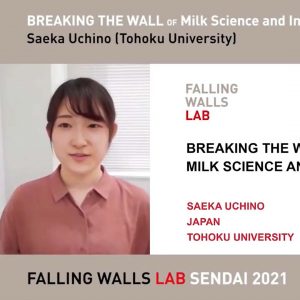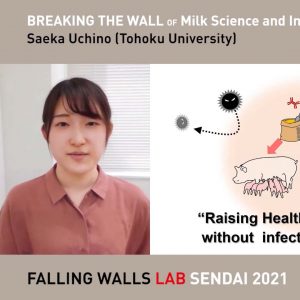Saeka Uchino
 © DWIH Tokyo / Saeka Uchino
© DWIH Tokyo / Saeka Uchino
Tohoku University, in partnership with DWIH Tokyo, the Tohoku Forum for Creativity (TFC), and the University Research Administration (URA) Center, on August 31, 2021, co-hosted Falling Walls Lab Sendai 2021 (FWL Sendai 2021).
We interviewed Saeka Uchino, who took first place in the event. Uchino, who is in the doctoral program at Tohoku University, gave a presentation titled, “Falling the Wall of Milk Science and Immunology.”

— If you're wavering, you should definitely take up the challenge!FWL Sendai 2021 (Saeka Uchino)
Please tell us a little bit about yourself.
My name is Saeka Uchino, and I am a Ph.D. student in the Graduate School of Agricultural Science at Tohoku University. I’m originally from Tokyo, but I did my undergraduate studies in animal husbandry at Shinshu University (Nagano Prefecture), where I was also heavily involved with the Yosakoi (Japanese folk dancing) extracurricular club. I was greatly impressed by a presentation at a conference I attended when I was an undergraduate student that was made by someone from my current institution. I came to Tohoku University after completing my master’s degree, and since then I’ve spent every day immersed in my research on animal immunology.
How do you feel about participating in Falling Walls Lab Sendai 2021, and about having earned first place?
All the other researchers and students who were taking part in the event were fluent in English. Having to talk about my own research in English was difficult for me, so that made me very nervous. I still can’t believe that I took first place.
Did you have fun giving your presentation?
Yes. I was nervous, but I practiced every day. This summer, Ms. Atsuko Kohata* coached me on making presentations. The one thing that she emphasized was that I should practice my presentation every day– “Practice, practice, practice“ is what she used to say—so that’s what I did. Thanks to her advice, I wasn’t so nervous when I actually had to give my presentation. My nervousness went away once I started and I was able to speak like I always do.
Please tell us in simple terms about the research findings you presented at FWL Sendai 2021. What do you think was ground-breaking about your work? Or, to approach this from a different angle, what sorts of difficulties did you have to overcome in the couse of your research?
A mother’s milk is rich with an immune substance known as immunoglobulin A (IgA) antibody. This substance provides immune functions for the newly born offspring whose own immune functions have yet to develop. I had the idea that, if I could easily create an IgA antibody in mother’s milk in a laboratory, then perhaps I could nurture healthy offspring by adding this substance to the feed and milk powder for that livestock. By fusing IgA-generating cells isolated from a mouse’s mammary glands with immortal cells, I created a cell strain that would produce unlimited amounts of IgA antibodies in a mother’s milk. The ground-breaking aspect of this research is that it has made it possible to manufacture IgA antibodies in mother’s milk by applying the classic technique for manufacturing antibody-forming cells to cells that originate in mammary glands. At first, my attempts at fusion did not go well. However, based on advice I received from my mentor Professor Nochi [Tomonori] I kept changing the conditions and, after some trial and error, I succeeded in creating the cells.
Please tell us something about what motivated you to do the research you described in your presentation.
From the experience I had doing part-time work milking cows for a farmer when I was an undergrad, I learned that infectious diseases in livestock are a serious problem for dairy farmers, which may destroy their business due to having to treat and cull herds. Furthermore, even among humans many infants die every year from pneumonia and diarrhoea caused by infections. Improving infant mortality rates in developing countries in particular is an international issue often touted in the Sustainable Development Goals (SDGs). I wanted to come up with a science-based solution that could potentially hold the key for the health of not just livestock but also humanity by doing research on “mammary immunity” from an animal husbandry perspective—that being the field that is concerned with milk production. That led me to begin my research on milk-based immunity.
What motivated you to participate in this event?
When I was an undergrad, I saw the Falling Walls Lab 2018 event on YouTube and I thought “This is really cool!” I’ve been a fan ever since. For the two years after that, though, I kept making excuses to not participate, like “Only after I’ve done more research” and “Only after I’ve improved my English.” However, this year, Professor Nochi gave me the push I needed, telling me “The sooner you take on this challenge the better! Just give it a try!” and so I made up my mind to take part.

— I wanted to come up with a science-based solution that could potentially hold the key for the health of not just livestock but also humanity by doing research on "mammary immunity" from an animal husbandry perspective—that being the field that is concerned with milk production.FWL Sendai 2021 (Saeka Uchino)
Did you encounter any difficulties in preparing for the event? If you did, what were they, and what did you learn from this?
I went through some trial and error in coming up with a three-minute presentation on a specialized topic that would be interesting and make an impression on the people I would be talking to. Usually, one would be talking to people who are already interested in what one’s doing and focus on presenting the results of one’s research. With FWL, however, one must talk to people with a variety of backgrounds and get them interested in one’s subject. Therefore, I realized it was important that instead of focusing on an explanation of the data like I would for a scholarly presentation, I had to explain the connection between my research and social issues in a way that anyone could understand. Moreover, from watching numerous videos of presentations made by notable persons, I learned that when it comes to making an impression on listeners, it’s crucial that you make eye contact with them and really communicate.
The FWL events are an international competition for science communication. What do you think is important about science communication?
The important thing for communication among scientists (particularly ones from different fields) is coming up with new ideas and innovations in specialized areas. On the other hand, I think that what’s important about communication between scientists and non-scientists has been cast into sharp relief by the problem that the COVID-19 has presented us since 2020. This is because I believe that, if we are to have solutions that most people can accept for the increasingly complex social problems that face us today, we must share the science that provides the grounds for policy decisions and people’s behaviour in a form that everyone can understand. I also think that when it comes to cultivating people who can engage in this sort of science communication moving forward, graduate students and young researchers should actively get out of their specialized areas to talk about their research.
What sorts of things were you careful about in making this presentation to viewers who are unfamiliar with your field of study?
I was careful about not using words that they might not know. I’m sure many people have had the experience of listening to someone talk and find that the instant a term comes up that they do not know, their thinking stops for just a second and then they lose track of the discussion. I wanted everybody, with no exceptions, to listen to my presentation all the way through, so I showed it to the people around me and asked them to point out any words they didn’t know. I was then very thorough about replacing those words with simpler language.
How would you encourage people who are considering participating in future FWL events?
I think the experience of getting a real sense of just how difficult it is to get something across to people from different fields and countries in a way that everyone can understand, and then figuring it out through trial and error is extremely useful. I personally also think that it offers a good opportunity for the many Japanese who worry about failing or being laughed at to overcome their mental barriers. If you’re wavering, you should definitely take up the challenge!
*Those speakers at FWL Sendai 2021 who wanted it received presentation coaching beforehand from Ms. Kohata Atsuko, a bilingual radio and television personality, who also acted as the MC of the event.
Interview: Chiaki Motoshima (DWIH Tokyo)
